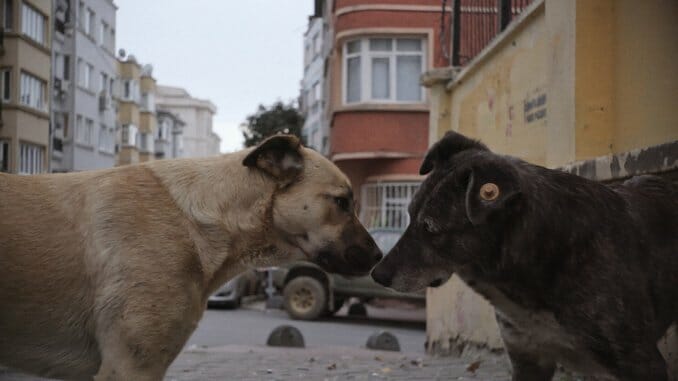Elizabeth Lo’s Stray Captures the Contradictions of Compassion

Told through a series of metropolitan vignettes, documentary filmmaker Elizabeth Lo’s Stray deftly weaves together a sprawling narrative of human and canine vagabond life on Istanbul’s city streets. While the ostensible focus of the film is on three particular stray dogs—the graceful Zeytin, affable Nazar and unbearably adorable pup Kartal—Lo’s camera is equally invested in portraying the city’s relationship to its refugee population, questioning exactly which street-dwelling denizens Turkish citizens express more compassion towards.
From this synopsis alone, viewers might already be drawing comparisons to the other filmic exploration of Turkish sentiments toward transient animals: Stray’s undeniable spiritual predecessor, Kedi (2016), documents the same city’s cohabitation with its rampant street cat population. Yet Lo’s film opts away entirely from Kedi’s relatively traditional docu-narrative style, allowing shots of canine facial expressions and fleeting interactions with humans to communicate ideas about migration and mutual aid as opposed to platforming straightforward anecdotes of human encounters with strays. The most profound musings on man’s relationship with mutt come from centuries-old quotes from Anatolian philosophers interspersed throughout the documentary via delicate title cards. “Dogs and philosophers do the greatest good and get the fewest rewards,” wrote Diogenes in 368 B.C. An astute statement, sure—but it’s clear that those who go largely unappreciated can always find solace in their kinship with canines.
Though an enduring fondness for dogs is deeply rooted in the region, the film provides key context as to why Turks have such a storied camaraderie with destitute animals. Back in 1909, Turkish authorities began cracking down on the stray dog population, a decision which led to the century-long practice of extermination en masse. This inhumane culling method enraged the population to such a fervent degree that Turkey is now distinguishable as one of the only countries in the world where it is illegal to kill or capture stray dogs.
However, Stray is careful to not oversimplify the widely-accepted reverence for man’s best friend. “Who allows you to shit wherever you want? Leave, or you’re going to get rounded up,” warns an obvious tourist who grows wary of Zeytin’s close distance, who in return appears to be smiling widely, almost as if to say: “They’ll tell you to leave before they even think about shooing me.”
Of course, legislation that is a sweeping victory for dog-kind can’t help but feel like a slap in the face to the country’s significant immigrant population, the influx of which has been classified as nothing short of a “crisis.” This has had an undeniable focus on those displaced by the Syrian Civil War, who at 3.6 million make up the highest fraction of “registered” refugees in Turkey.
-

-

-

-

-

-

-

-

-

-

-

-

-

-

-

-

-

-

-

-

-

-

-

-

-

-

-

-

-

-

-

-

-

-

-

-

-

-

-

-








































